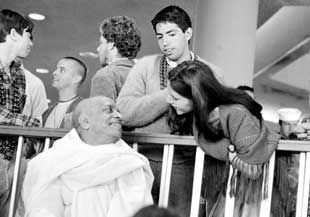People we meet or know who impress us the most are those that extend us kindness and heartfelt interest. We may appreciate a person’s beauty, strength, wealth, knowledge, fame, or renunciation (qualities Krishna has in full), but if a person is not kind it stands out like a huge blemish. A lessor person who is kind and friendly appears more valuable, and greater. Of the twenty-six qualities of a devotee given in the great Gaudiya Vaishnava scripture, Shri Chaitanya Charitamrita, we find that kindness to others is the very first quality. Therefore, being a being an advanced devotee of Krishna means to be kind by nature. The six Goswamis disciples of Lord Chaitanya were “popular both to the gentle and with the ruffians”. Everyone appreciated them because of their equanimity and kindness.
While it is said that such qualities “automatically” develop in a devotee, it is a gradual process, and presently even if we don’t feel kind, or that a situation warrants it, we can still choose to extend it as part of our spiritual practice. Making a decision to be kind to others within our life will help us develop it as a habit. If we study the activities of great devotee’s we will see kindness in action in their everyday lives, not just while they give classes, or in an official capacity as a devotee. While ultimate kindness means sharing knowledge about Krishna, our method of delivery is all important, and ordinary human kindness is not excluded. This is the meaning of the saying that “example is better than precept.” One of my favorite quotes from Emerson speaks about the power of character: "Who you are is screaming so loud I can't hear what you are saying." The teachings and Vedic translations of Shrila Prabhupada are impressive and attractive, but what was most prominent about him that captured our faith in what he said? It wasn’t just his words or great intelligence (impressive as they were), but who he was as a person—his kindness, compassion, and genuine concern for us. His human kindness made his spirituality accessible and tangible, as this is universally appreciated. We could feel that he cared about and loved us and had all the time in the world to answer our question, or help us deal with a pressing issue, or even mundane concerns. When people came to visit him, he was never annoyed, distracted, or looking at his watch. He was fully present, put us at ease, and was encouraging. That disarmed us, opened our heart, and helped us accept Krishna consciousness, even the parts we couldn’t fathom. His kindness was the face of bhakti, and captured our dedication. He lived what he spoke about, and that helped us want what he had.
The teachings and Vedic translations of Shrila Prabhupada are impressive and attractive, but what was most prominent about him that captured our faith in what he said? It wasn’t just his words or great intelligence (impressive as they were), but who he was as a person—his kindness, compassion, and genuine concern for us. His human kindness made his spirituality accessible and tangible, as this is universally appreciated. We could feel that he cared about and loved us and had all the time in the world to answer our question, or help us deal with a pressing issue, or even mundane concerns. When people came to visit him, he was never annoyed, distracted, or looking at his watch. He was fully present, put us at ease, and was encouraging. That disarmed us, opened our heart, and helped us accept Krishna consciousness, even the parts we couldn’t fathom. His kindness was the face of bhakti, and captured our dedication. He lived what he spoke about, and that helped us want what he had.
Great teachers of all time and traditions are by nature kind and compassionate to others. In theistic traditions, such kindness is an extension of their love for God. We read in the Shrimad Bhagavatam glorification about its main speaker, Shukadeva Goswami: “Let me offer my respectful obeisances unto him [Shukadeva], the spiritual master of all sages, the son of Vyasadeva, who, out of his great compassion for those gross materialists who struggle to cross over the darkest regions of material existence, spoke this most confidential supplement to the cream of Vedic knowledge, after having personally assimilated it by experience.” [ SB 1.2.3]
 Shukadeva Goswami spoke such an incomparable scripture not for any material purpose, but out of his natural compassion for the suffering condition of soul’s living in the material world in ignorance of the true source of happiness: service to Krishna. Those who follow such great devotees continue to attract others to Krishna, to the extent that they can exemplify the spirit of kindness in their presentation of Krishna consciousness. Every generation of Gaudiya Vaishnavism is headed by supremely kind devotees who live to help and benefit others through giving authentic spirituality in love and service to Krishna.
Shukadeva Goswami spoke such an incomparable scripture not for any material purpose, but out of his natural compassion for the suffering condition of soul’s living in the material world in ignorance of the true source of happiness: service to Krishna. Those who follow such great devotees continue to attract others to Krishna, to the extent that they can exemplify the spirit of kindness in their presentation of Krishna consciousness. Every generation of Gaudiya Vaishnavism is headed by supremely kind devotees who live to help and benefit others through giving authentic spirituality in love and service to Krishna.
Though we may not be great practitioners of bhakti, we can still be kind to others in an everyday sense, and in a spiritual sense. They really go together and can’t be separated. We do not want to hit someone over the head with the scriptures thinking we are giving the supreme kindness. Preaching “at” someone is never as effective as speaking to them personally, with kindness and concern. Our character creates a receptive mood in the audience, and will enable them to be more receptive, as I described in the character of Shrila Prabhupada. In life we are given the opportunity to practice our ideals in our relationships with others. Krishna consciousness does not live only in books, but in our hearts and lives, and how we practice it. Our relationships and interactions with our friends, family, and strangers test the depth of our spiritual realization, and how much we really care—not officially, but in truth. Kindness matters, and we will be appreciated by how much we give it, not by how much we know. What we have realized will be shown by our actions.


Comments